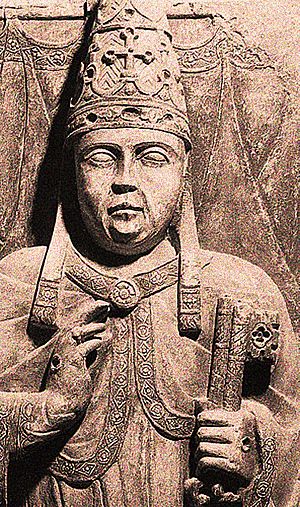Pope Benedict XII facts for kids
Quick facts for kids Pope Benedict XII |
|
|---|---|
| Bishop of Rome | |

Effigy of Benedict XII
|
|
| Church | Catholic Church |
| Papacy began | 30 December 1334 |
| Papacy ended | 25 April 1342 |
| Predecessor | John XXII |
| Successor | Clement VI |
| Orders | |
| Consecration | 1317 by Niccolò Alberti |
| Created Cardinal | 18 December 1327 |
| Personal details | |
| Birth name | Jacques Fornier |
| Born | 1285 Saverdun, Kingdom of France |
| Died | 25 April 1342 (aged 56–57) Avignon, County of Provence |
| Coat of arms |  |
| Other Popes named Benedict | |
Pope Benedict XII, born Jacques Fournier (1285 – 25 April 1342), was the leader of the Catholic Church from December 30, 1334, until his death in April 1342. He was the third pope to live in Avignon, France, instead of Rome.
Benedict XII was known as a careful and reforming pope. He worked to improve religious groups called monastic orders. He also spoke out against nepotism, which is when people in power give special jobs or favors to their family members. He wanted to move the Church's main office back to Rome or Bologna, but he couldn't. So, he began building a large palace for the popes in Avignon. He also made an important decision about what happens to souls after death. He said that souls could reach a state of perfect happiness with God (called the "beatific vision") before the Last Judgment. Benedict was a strong reformer. He tried to bring the Eastern Orthodox and Catholic Churches back together. These two branches of Christianity had split almost 300 years earlier in the Great Schism. However, his efforts were not successful. He also tried to find common ground with Emperor Louis IV, but this also failed.
Contents
Early Life and Education
Not much is known about Jacques Fournier's early life. He was likely born around the 1280s in Canté, a small town in France. His family was not wealthy.
He became a Cistercian monk and later studied at the University of Paris. In 1311, he became the Abbot (leader) of Fontfroide Abbey. He quickly became known for his intelligence and his ability to organize things well.
Becoming a Bishop and Cardinal
In 1317, Jacques Fournier became the Bishop of Pamiers. In this role, he worked hard to find and deal with people who followed Catharism. This was a religious movement that the Church considered to be heresy. His actions earned him praise from Church leaders. However, they also made him unpopular with some local people.
His work against the Cathars was carefully written down in a book called the Fournier Register. He took this book to Rome and placed it in the Vatican Library. This record has been studied by historians.
In 1326, after the Cathar movement was believed to be ended in the south of France, he became the Bishop of Mirepoix. A year later, in 1327, he was made a cardinal. This is a very high rank in the Catholic Church.
Becoming Pope
Jacques Fournier became pope after Pope John XXII died. The election for the new pope, called a conclave, began on December 13, 1334.
At first, it seemed like Cardinal Jean-Raymond de Comminges might be quickly elected. Many cardinals were ready to choose him. However, they wanted him to promise that he would not move the papacy back to Rome. Cardinal Comminges refused to make any promises just to get elected.
So, the election continued with many long discussions. Jacques Fournier himself said that there were "others more conspicuous for the repute of their great merits." This meant there were many other strong candidates. But in the end, Jacques Fournier, the Cistercian cardinal, was elected pope on the evening of December 20, 1334. This happened on the eighth day of the conclave.
Papal Policies and Actions
Pope Benedict XII was a reforming pope. He did not continue all the policies of the pope before him. He tried to make peace with the Holy Roman Emperor Louis IV. He also worked to resolve disagreements with the Franciscan religious order.
Benedict XII tried to reduce the luxurious lifestyles of the monastic orders. However, he did not have much success with this. He also ordered the building of the Palais des Papes (Palace of the Popes) in Avignon.
Most of Benedict's time was spent on questions of theology, which is the study of religious faith. He disagreed with many ideas that Pope John XXII had supported. In 1336, he issued an important Church document called Benedictus Deus. This document stated the Church's belief that the souls of people who have died go to their eternal reward right away. They do not remain in an unconscious state until the Last Judgment.
Although he was born in France, Benedict XII did not show special loyalty to France or its king, Philip VI. From the very beginning of his time as pope, his relationship with King Philip was cool. When he heard about Philip's plan to invade Scotland, Benedict even suggested that King Edward III of England would probably win.
See also
 In Spanish: Benedicto XII para niños
In Spanish: Benedicto XII para niños
 | Janet Taylor Pickett |
 | Synthia Saint James |
 | Howardena Pindell |
 | Faith Ringgold |

